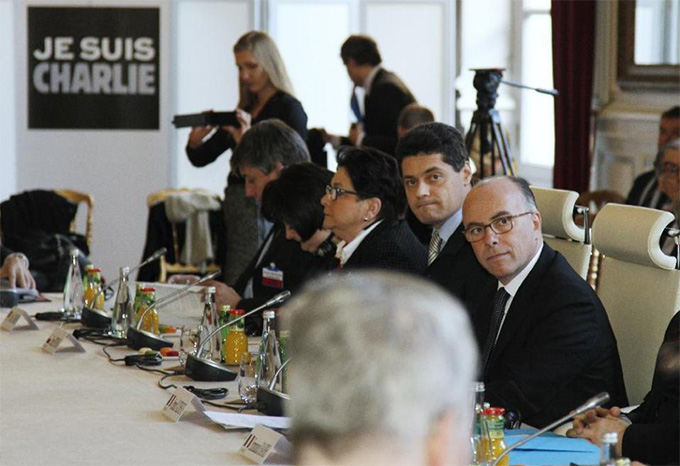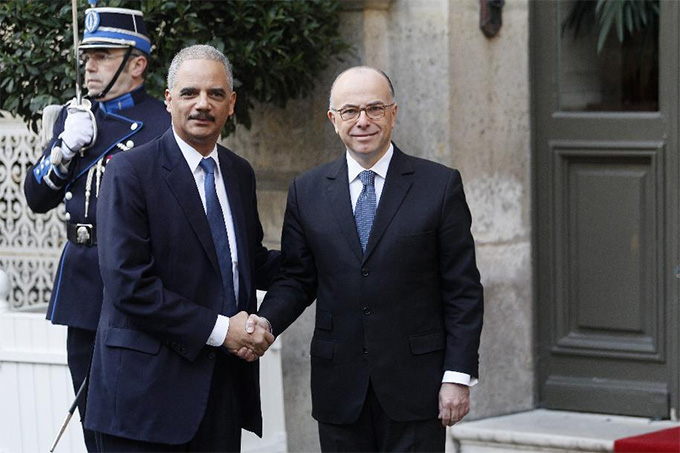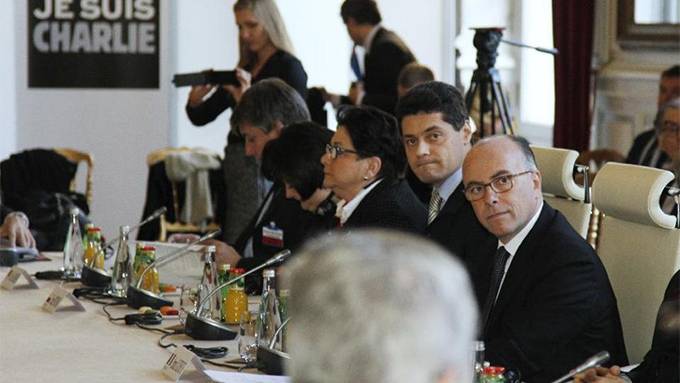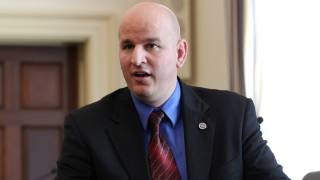Internet Censorhip and Border Monitoring "Needed to Thwart Further Attacks" says French Minister
Source: news.yahoo.com
Comment: Terrorism hits home. The establishment in Europe is jumping on the opportunity to make life more difficult for Europeans, as we are the ones who will be treated like terrorists. We have in the line up: More internet censorship, more surveillance at home and more funding for wars abroad that will lead to further intervention policies and attacks. Why not instead stop the failed multicultural experiment that has enable such attacks to take place in the first place and then also back out of the middle east and stop funding terrorists groups in Syria and other countries.No instead the focus will turn inward, why? Because sadly, Europe have dropped their guards and let known terrorists back into the continent. Below is the story from AFP:

French Interior Minister Bernard Cazeneuve (R) chairs an international meeting against terrorism at the interior ministry in Paris on January 11, 2015
Increased Internet surveillance and tighter border checks are "urgently" needed to foil jihadist attacks of the sort that rocked Paris this week, European, US and Canadian security ministers agreed Sunday.
The gathering of interior and justice ministers at the French interior ministry was held before a massive anti-terror march in Paris that included dozens of foreign leaders.
A joint statement by the ministers -- representing 11 EU nations including France, Britain, Germany, Sweden and Poland, as well as the European commissioner for migration and home affairs, and US Attorney General Eric Holder -- emphasised their "determination to fight together against terrorism".
They said it was "essential" that major Internet providers cooperate with governments in closely monitoring.
“We forcefully noted the need for greater cooperation with Internet companies to guarantee the reporting and removal of illegal content, particularly content that makes apologies for terrorism or promotes violence or hate,” said French Interior Minister Bernard Cazeneuve.Comment: Watch out. the PC police is coming!
They also want to "step up the detection and screening of travel movements of European nationals" leaving or entering the EU's external borders, and modify Europe's internal Schengen freedom-of-movement rules to widen information sharing and subject suspect passengers to greater checks.
They saw a "crucial and urgent need" to establish an EU-wide database of passenger information for travel inside Europe and for flights leaving or entering the 28-nation bloc.
The proposed measures are to be discussed further at a February 12 EU summit focused on reinforcing security.
Holder announced a broader February 18 summit in Washington to be hosted by US President Barack Obama.

French Interior Minister Bernard Cazeneuve (R) welcomes US Attorney General Eric Holder on January 11, 2015 at the Interior Ministry in Paris.
Related: Eric Holder: Organized Crime’s Man of the Year hails Sweden as ’human rights champion’
The steps were unveiled after three days of carnage in Paris by three gunmen who claimed allegiance to Al-Qaeda in Yemen and the rival Islamic State group.
The violence began with a bloody attack on the satirical newspaper Charlie Hebdo on Wednesday, when two of the gunmen killed 12 people.
Twin assaults by French commandos on the gunmen holed up in two separate locations -- in a town outside Paris and in a Jewish supermarket in the capital -- ended with the Islamists' deaths on Friday.
- Civil liberty concerns -
Holder said Sunday that the announced US summit would "discuss ways in which we can counteract this violent extremism that exists around the world".
"Only if we work together, through sharing of information, by pooling our resources, will we ultimately be able to defeat those who are in a struggle with us about our fundamental values," he told reporters.
The interior and justice ministers stressed in their joint statement that the enhanced monitoring of the Internet should be done with respect to it remaining "a forum for free expression".
But there are fears by some civil liberty groups that such state pressure on private Internet companies could erode citizens' rights and freedom of expression online, especially in the wake of the scandal over electronic snooping by the United States' NSA.
The increased checks on travel by Europeans was also of concern.
The European parliament and others want to ensure limits are imposed on the sharing of passenger data with the US to prevent Europeans being exposed to unwarranted prying.
Undermining Schengen freedoms that have opened up most of the EU's internal borders are also seen as a slapdown of one of the bloc's most cherished principles.
- European-born jihadists -
In the wake of the Paris attacks, though, voices demanding reinforced domestic security against jihadists were louder than those championing personal freedoms.
The EU commissioner for migration and home affairs, Dimitris Avramopoulos, said authorities are "determined to move ahead in coordinating our efforts within Europe and with our international friends in order to give an end to this drama and this phenomenon".
French Interior Minister Bernard Cazeneuve emphasised the problem of "foreign jihadist fighters in Syria and Iraq" many of whom come from EU countries -- particularly those with sizeable Muslim populations such as France, Britain and Germany.
Information on them and on "terrorist networks" must be shared between the allied countries, he said.
"We are resolved to fight against terrorism," Cazeneuve told a news conference.
He said existing laws and organisations such as Interpol and its European counterpart Europol already played a role but that a "global approach" was now needed to counter the threat to countries that shared democratic values.
He added that the focus on the Internet also highlighted the need to provide positive messages to counter jihadist propaganda attempting to radicalise European youth.
The gunmen in the Paris attacks were French-born and French citizens.
The two brothers, Said and Cherif Kouachi, were of Algerian descent and are believed to have been radicalised in Paris's poor immigrant suburbs. They were already on a US no-fly list.
The other, Amedy Coulibaly, a serial criminal of Malian background, was thought to have become an extremist while in prison.
The French government has admitted to shortcomings in its surveillance of the gunmen, who were known to its intelligence services.
Source: yahoo.com






















